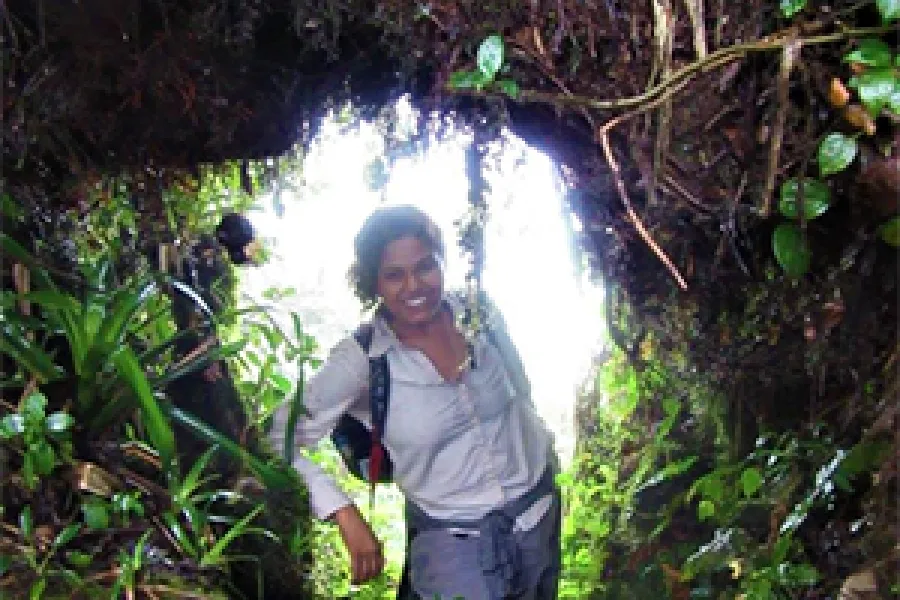Two University of Illinois graduate students have won the Smithsonian Institution Predoctoral Fellowship, Lynette Strickland and Susana “Xuxa” Rodriguez. Strickland is a doctoral candidate in Animal Biology and Rodriguez is a doctoral candidate in Art History.
The Smithsonian Institution Fellowship Program supports research and study for up to a year in a variety of fields and in all levels of graduate education, including master’s, predoctoral, dissertation, and postdoctoral. This award is a 12-month fellowship provides $32,700 annually plus a $4,000 research allowance. The fellowship takes place in the Smithsonian research complex in Washington D.C. but may also take place in one of Smithsonian’s other facilities. The application deadline is typically in early December.
Strickland’s dissertation research focuses on a Neotropical beetle species that displays five different color variants. She is currently working at the Smithsonian Tropical Research Institute on a Panamanian population of this species to identify differences in the genomes that create these color variants, as well as the ecological consequences of color variation for this species in its natural environment.
“I am beyond thrilled that the Smithsonian has given me this opportunity to purse my passions,” says Strickland. “Being able to work with a system that I love, in one of the most diverse and beautiful environments in the world is every student’s dream, and one that not everyone has the opportunity to pursue. I am so grateful that I am able to work with, and be trained by, some of the best tropical biologists at one of the greatest scientific institutions.”
Rodriguez’s dissertation research examines the work of four Cuban-American women artists who use the body in politically explicit performance art. She aims to bring new knowledge to the field by demonstrating how the body in performance art allows for a unique expression of Cuban exile identity – one that is both distinct from expressions by visual arts and historically bound to the political relationship between Cuba and the United States.
“I am very excited and honored to receive this award,” says Rodriguez. Being able to return to the Smithsonian is a dream come true after serving as a Smithsonian Latino Museum Studies Program Fellow in 2014! This fellowship is important not only because it helps me in achieving my scholarly goal of producing a feminist art history of contemporary American performance art, but it also brings me one step closer to my career goal of working for the Smithsonian to support its strategic plan’s grand challenge of understanding the American experience.”
Colleen Vojak, assistant director of external fellowships in the Graduate College, worked with the two students and is thrilled about their wins: “It is gratifying to see Lynette and Xuxa receive these prestigious awards. Not only are they talented young scholars in their fields, they are also strongly engaged in their community and both serve as excellent role models to future scientists and art historians.”
The Graduate College provide services to help Illinois graduate students compete for external grants and fellowships, such as the Fellowship Finder database , online resources, proposal-writing workshops, and one-on-one proposal advising. Vojak is one of three proposal writing experts in the Graduate College who work with graduate students applying for fellowship offered by private foundations, government agencies, and corporations such as the National Science Foundation, Ford Foundation, American Association of University Women, National Institutes of Health, Google, Fulbright, and hundreds of others.
To learn more about the Graduate College’s external fellowship resources and services visit: www.grad.illinois.edu/extfellowships
For more information about the Smithsonian Institution Fellowship Program visit: https://www.smithsonianofi.com/fellowship-opportunities/smithsonian-institution-fellowship-program
Story by Enrique Rodarte
